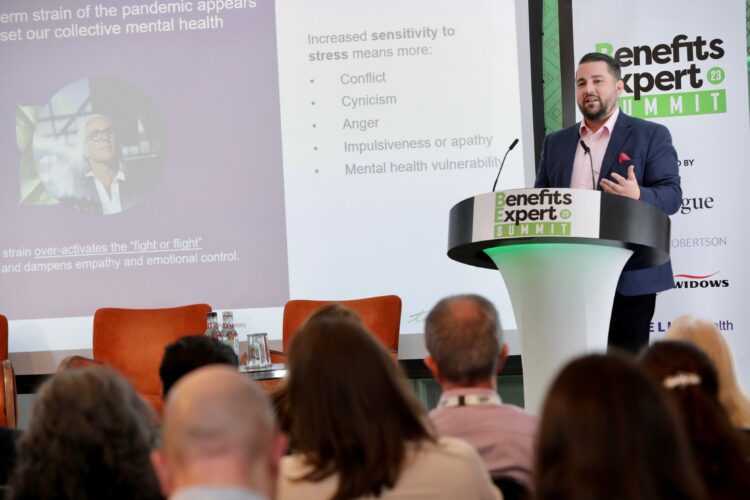The overall mental health landscape is changing significantly, calling for essential adjustments in mitigation efforts.
That was the main takeaway from Telus Health head of alliances EMEA Luke Prankard who spoke at the Benefit Expert summit about the company’s most recent findings and research, the challenges its workplace faces and the steps that must be taken to enhance people’s mental health and wellbeing. He spoke about the current state of workers’ mental health and what is impacting them today, the workplace landscape and leaders’ role and resilience.
According to Telus Health’s analysis, only 18% of the European nations under consideration have minimal mental health risk; the other 44% have moderate risk and the other 37% have severe risk.
Prankard explains that high risk can take many forms, including a two- to three-fold rise in high-risk behaviour linked to alcohol use and a one-in-two chance of elevated stress sensitivity. He attributes these patterns to the ongoing strain of the pandemic, proposing that a reset in collective mental health has left the workplace more vulnerable to stress and the rise of negative psychological states like anger, impulsivity, conflict, cynicism, apathy, and general mental vulnerability.
Prankard notes prevalent challenges in executive function, as indicated by research from Telus Health, with half of employees experiencing persistent problems: 49% feel disorganised, 42% find it difficult to finish critical activities, and 37% find it difficult to assimilate new knowledge.
These difficulties are particularly noticeable in workers under 40 and are highly associated with lower productivity, heightened anxiety, and depression—even in cases where executive function problems are not the root reason.
Younger generations are disproportionately affected by the growing problems with mental health, which were obvious even before the epidemic.
A growing sense of loneliness, a declining faith in youth friendships, the sense of a fast-paced society, feelings of being overwhelmed, increased anxiety, financial risk from not having emergency savings, and the fact that only half of employees know about Employee Assistance Programmes (EAP) are some of the factors that are contributing to this. Furthermore, a lot of people who know about EAPs have misconceptions about them that prevent them from being used.












